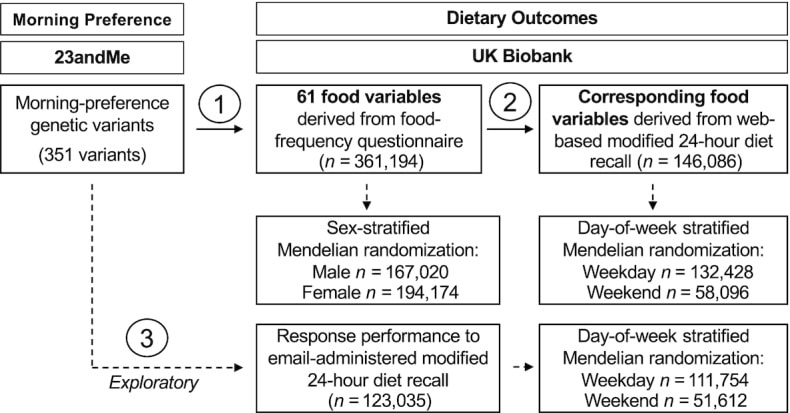Morning diurnal preference and food intake: a Mendelian randomization study

Background: Poor dietary choices may underlie known associations between having an evening diurnal preference and cardiometabolic diseases. Assessing causal links between diurnal preference and food intake is now possible in Mendelian randomization (MR) analyses.
Objectives: We aimed to use a 2-sample MR to determine potential causal effects of genetic liability to a morning preference on food intake. We also examined potential causal effects of a morning preference on objectively captured response performances to email-administered 24-h diet recalls.
Methods: We used genetic variants associated with a morning preference from a published genome-wide association meta-analysis. Our outcomes included 61 food items with estimates from a food-frequency questionnaire in the UK Biobank (n = 361,194). For significant findings, we repeated the analysis using intake estimates from modified 24-h diet recalls in a subset of overlapping participants (n = 146,086). In addition, we examined 7 response performance outcomes, including the time and duration of responses to 24-h diet recalls (n = 123,035). MR effects were estimated using an inverse-variance weighted analysis.
Results: Genetic liability to a morning preference was associated with increased intake of 6 food items (fresh fruit, alcohol with meals, bran cereal, cereals, dried fruit, and water), decreased intake of 4 food items (beer plus cider, processed meat, other cereals [e.g., corn or frosted flakes], and full cream milk), increased temperature of hot drinks, and decreased variation in diet (PFalse Discovery Rate < 0.05). There was no evidence for an effect on coffee or tea intake. Findings for fresh fruit, beer plus cider, bran cereal, and cereal were consistent when intakes were estimated by 24-h diet recalls (P < 0.05). We also identified potential causal links between a morning preference with earlier timing and a shorter duration for completing email-administered 24-h diet recalls.
Conclusions: Our findings provide evidence for a potentially causal effect of a morning preference with the increased intake of foods known to constitute a healthy diet, suggesting possible health benefits of adopting a more morning diurnal preference.
Keywords: Mendelian randomization; UK Biobank; chronobiology; diurnal preference; food intake.

